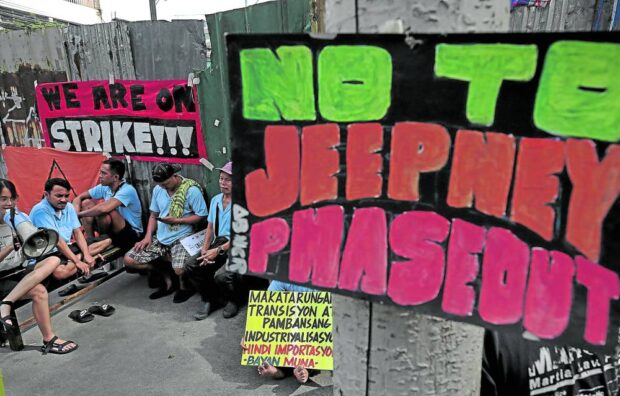PUV group again warns of new transport crisis

AGAINST MODERNIZATION Public utility vehicle drivers protest at a jeepney terminal in Manila. —RICHARD A. REYES
Transport group Manibela again threatened that its members, numbering up to 200,000, may just decide to spark another transportation crisis because of the Public Utility Vehicle Modernization Program (PUVMP).
“After today, we may stop going out on the road,” Manibela president Mar Valbuena said in a radio interview, insisting that his group was not blackmailing the government.
“After our protest today, we may decide if we will make our transport strike permanent by not returning to ferry passengers,” Valbuena said on the last of their three-day transport strike.
Manibela and another transport group, Piston, carried out this week separate three-day transport strikes in different parts of the country to protest the Dec. 31 deadline for franchise consolidation applications under the PUVMP.
Under the program, PUV franchise holders are required to upgrade their vehicles with newer and larger units by “consolidating” with other franchise holders in cooperatives or corporations that are expected to have resources to acquire acceptable, but more expensive, vehicles.
Article continues after this advertisementThe move is envisioned to increase PUV passenger capacities while reducing vehicle emissions and increasing driver or operator accountability.
Article continues after this advertisement6-year talks
The PUVMP has been under discussion since 2017 with the government expressing willingness to reasonably adjust deadlines while franchise holders have repeatedly pushed postponements of the program by threatening a repeat of the last transportation crisis that occurred in the late 1980s under the administration of former President Corazon Aquino.
Transportation Secretary Jaime Bautista, however, earlier said the consolidation requirement of PUV operators and drivers into cooperatives or corporations was “nonnegotiable.”
In a statement on Friday, Celine Pialago, spokesperson for the Land Transportation Franchising and Regulatory Board (LTFRB), said they were still evaluating the overall impact of Manibela’s transport strike.
“Our initial assessment showed that their transport strike only had minimal impact,” she said.
The LTFRB claimed that majority of drivers and operators were positive about franchise consolidation to make applying for loans easier and more efficient.
As of Oct. 31, a total of 109,017, or 56.7 percent of the public utility jeepneys and UV Express vans, have consolidated to form cooperatives or corporations.
These PUV units cover a total of 4,108 routes, or 61.9 percent of all the routes nationwide.
No phaseout … yet
The LTFRB earlier clarified that traditional jeepneys would still be allowed to ply the roads as long as they were able to file their petition for consolidation by Dec. 31, and their units are deemed roadworthy by the Land Transportation Office.
“The consolidation component is important for the government to check the quality of the PUV units, and to check the documents of the cooperatives or corporations under the PUVMP,” Pialago explained.
READ: Another 3-day strike set, this time by Manibela
If drivers and operators fail to consolidate by the end of the year, they would still be allowed to operate, considering the expected shortage in of PUVs in some routes.
But those who fail to apply for consolidation will have to wait for the next omnibus franchise guidelines, which could take up to 27 months, or apply for social support from the Department of Labor and Employment and Technical Education and Skills Development Authority.